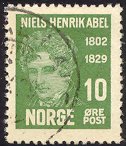

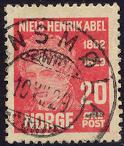
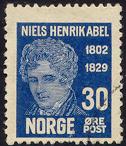
Niels Henrik Abel
Norway




1929. Centenary death anniversary of Abel
| SG213 | 10 ore | Abel |
| SG214 | 15 ore | Abel |
| SG215 | 20 ore | Abel |
| SG216 | 30 ore | Abel |
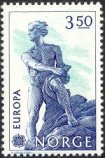
1983. Europa
| SG917 | 3 krone 50 | Abel |
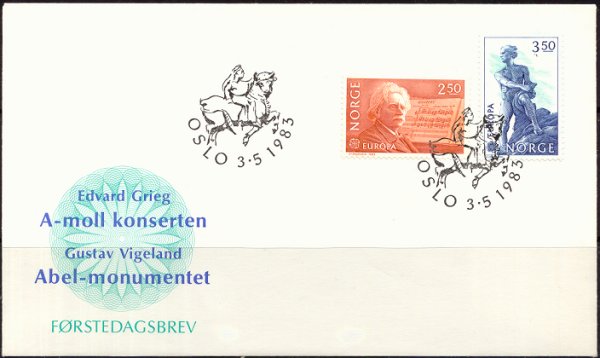
First day cover
| Abel was born in Frindoe, Norway in
August 1802, yet he had to spent most of his childhood in Gjerstad much due to
the political conflicts of Norway at that time. Though his grandfather, who died
when Abel was only one year old, and then his father were Protestant
ministers of Gjerstad, the family was in poverty and that, indeed, dominated all
Abel's life. The early years at school saw Abel as a talented pupil, and he started studied university level mathematics at the age of 15. Within one year, Abel nearly finished the works of Newton, Euler and D'Alembert and was encouraged by his teacher to move on to Laplace's and Lagrange's. Soon after that, in 1821, Abel enrolled the University of Christiania and took only one year for his graduation. During this time, Abel submitted a paper to the Royal Society of Copenhagen, in which he thought he had found radical solutions for quintic equations, a long time unsolved problem, but he himself soon discovered his mistake. Backing again to the problem, in 1824, Abel gave a proof of the insolubility of quintic equations by radicals, which he then published on Crelle's Journal. Abel also sent it to Gauss, but there is no clues why Gauss somehow did not pay any attention to it. Arriving in France later, Abel finished a few more papers on a certain class of transcendental functions, which were coincidently identical to those of Galois in 1830. Unfortunately, again they hardly received a glance from the referees, who, this time, were Cauchy and Legendre. In 1827, Abel came back to Norway in a serious ill state and had been poorly in debt. After some more mathematical masterpieces, he died in 1829. One year later, Abel, together with Jacobi, received the Grand Prix awards from the Paris Academy for their genuine contributions in Mathematics.
|
| Mathematics Home |
|
|
|
|
@ Hung